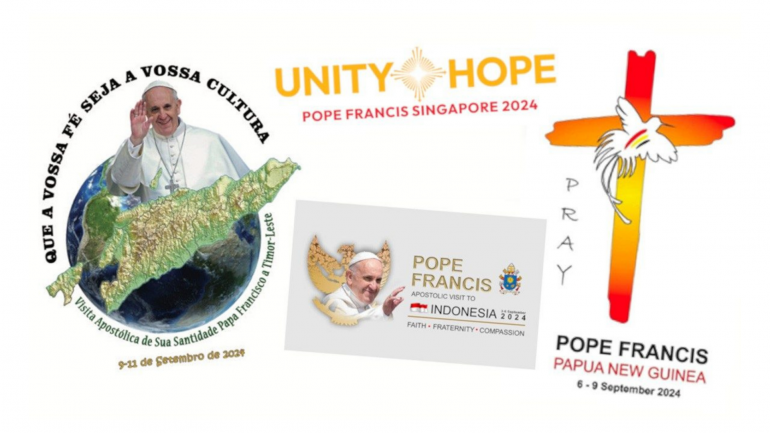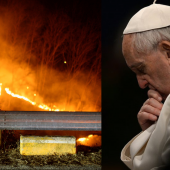Building bridges: The spiritual and interreligious significance of Pope Francis’ Apostolic visit to Indonesia

Introduction
As preparations intensify for Pope Francis’ apostolic visit to Indonesia, recent viral images have captured the attention of many across social media platforms.
The photos depict Mr. Tahir, a prominent Indonesian businessman, along with his family, during a private audience with Pope Francis in Vatican City.
These images have sparked curiosity, especially since Mr. Tahir is not a Catholic. They have led many to ask: Why would a non-Catholic make a spiritual visit to the Pope?
A Unique Interreligious Encounter
Although details about Mr. Tahir’s religious background remain unclear—he could be Buddhist or Confucian, given his Chinese heritage—one fact stands out: his support for Pope Francis’ visit to Indonesia.
It was revealed that Ignatius Jonan, a devout Catholic and former Minister of Transportation, approached Mr. Tahir to seek his financial backing for this historic event.
The collaboration between Jonan and Tahir, despite their different faiths, has garnered attention and admiration from Vatican officials. It is a testament to the power of interfaith cooperation for the greater good.
Pope Francis’ visit, scheduled for September 2024, will take him to several Southeast Asian and Oceanian countries, including Singapore, Indonesia, Timor-Leste, and Papua New Guinea.
The journey is logistically and financially demanding, requiring significant resources. Jonan, as the chairperson of the committee organizing the visit, took a proactive approach by establishing networks across religious and cultural lines to ensure the event’s success.
The Power of Building Bridges
Jonan’s ability to form alliances with diverse communities and external partners is a critical aspect of his leadership. His approach reflects the broader Christian call to build bridges and foster relationships for the common good.
In this regard, he embodies the spirit of Christ, who during His public ministry consistently reached out across boundaries to connect with others.
The Gospel highlights several instances where Jesus formed meaningful connections through dialogue and mutual trust. For example, the parable of the Good Samaritan (Luke 10:25-37) portrays the Samaritan’s collaboration with an innkeeper to care for a wounded traveler—an act rooted in trust and compassion.
Similarly, Jonan’s outreach to Mr. Tahir mirrors this spirit of collaboration, demonstrating that true partnership transcends religious and cultural differences.
John S. Dunne’s Concept of "Passing Over and Coming Back"
Jonan’s initiative also echoes the spiritual dynamics described by theologian John S. Dunne in his concept of "Passing Over and Coming Back." In his book The Way of All the Earth (1970), Dunne speaks of the spiritual journey where one momentarily steps into the religious experience of another, gaining new perspectives.
However, the journey does not end there; one must return to their own spiritual roots, transformed by the encounter. This process is not about conversion but about deepening one’s understanding and fostering dialogue.
Similarly, the collaboration between Jonan and Tahir can be seen as a “passing over” into mutual understanding—a willingness to engage with the other’s world, not to convert, but to cooperate for a shared goal.
The outcome is a "coming back" with enriched perspectives, stronger bonds, and renewed commitment to dialogue.
The Miracle of Dialogue and Encounter
The Gospels also illustrate that transformative encounters often happen within spaces of dialogue. For instance, Jesus’ encounter with the Syrophoenician woman (Matthew 15:21-28) led to a change in perspective, demonstrating the power of genuine interaction.
Reuel L. Howe’s The Miracle of Dialogue reminds us that dialogue can lead to transformative experiences that reshape how we see each other, breaking down barriers and fostering mutual respect.
Pope Francis himself embodies this spirit of dialogue in his encyclicals Laudato Si’ and Fratelli Tutti. In Laudato Si’, he calls for a culture of dialogue to address the ecological crisis. In Fratelli Tutti, he extends this invitation to all people of goodwill, emphasizing universal brotherhood and sisterhood.
Like St. Francis of Assisi, Pope Francis recognizes that our interconnectedness extends beyond humanity to include all creation—Brother Sun, Sister Moon, and Mother Earth.
Conclusion
Pope Francis’ upcoming apostolic journey to Southeast Asia is an opportunity to reaffirm the universal solidarity that binds creation together.
His visit will undoubtedly highlight the importance of interfaith dialogue and cooperation as foundational principles for peace, justice, and ecological integrity.
As we welcome Pope Francis to Indonesia, let us hope that his message and presence inspire deeper connections across religious and cultural divides, fostering unity and understanding in our shared human journey.
*The writer is a lay theologian and lecturer at the Philosophy and Theology Department of Parahyangan Catholic University, West Java, Indonesia
Radio Veritas Asia (RVA), a media platform of the Catholic Church, aims to share Christ. RVA started in 1969 as a continental Catholic radio station to serve Asian countries in their respective local language, thus earning the tag “the Voice of Asian Christianity.” Responding to the emerging context, RVA embraced media platforms to connect with the global Asian audience via its 21 language websites and various social media platforms.














